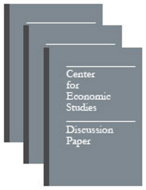Unemployment Duration And Geographic Mobility: Do Movers Fare Better Than Stayers?
Unemployment Duration And Geographic Mobility: Do Movers Fare Better Than Stayers?
Abstract
This study uses a sample of unemployed workers constructed from the American Community Survey and the LEHD database, to compare the unemployment durations of those who find subsequent employment by relocating to a metropolitan area outside of their originally observed residence, versus those who find employment in their original location. Results from a hazard analysis confirm the importance of many of the determinants of migration posited in the literature, such as age, education, and local labor market conditions. While simple averages and OLS estimates indicate that migrating for a new job reduces the probability of re-employment within a given time frame and lengthens the spell of unemployment in the aggregate, after controlling for selection into migration using an IV approach based on local house price changes, the results suggest that out-migrating for employment actually has a large and significant beneficial effect of shortening the time to re-employment. This implies that those who migrate for jobs in the data may be particularly disadvantaged in their ability to find employment and thus have a strong short-term incentive to relocate.




